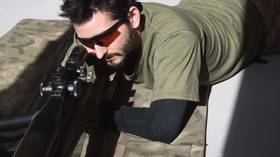Foreign military volunteers share their experiences of fighting in Ukraine
Fighters from several countries complain of corrupt commanders, suicide missions, poor equipment and intelligence in Ukraine
According to Ukrainian officials, over 20,000 foreign nationals from 52 countries have arrived in the country to participate in the ongoing military conflict between Russia and Ukraine. However, some have shared their experiences claiming that they had been asked to take part in suicide missions, others complain of corrupt commanders and little or poor equipment.
Mamuka Mamulashvili, who serves as the commander of the Georgian Legion – an international brigade set up in Ukraine in 2014 – told the UK’s Telegraph newspaper that he estimates that “70% of people who’ve come out to join the International Legion have already turned back,” adding that those who are coming into the country are too impatient to see combat. “This isn’t war tourism,” he says.
A volunteer from the UK, Matt Robinson, who serves as a military trainer in Kiev, noted that many of the foreign nationals coming into the country are severely unprepared for what awaits them as some of the recruits have nothing but simple hunting experience and basic survival skills.
“You’re likely to get hit by shelling long before you’ll ever get the chance to exchange fire with anybody, which is what most people want to do,” he warned, noting that the Russia-Ukraine conflict is primarily an artillery war, where soldiers spend most of their time taking cover rather than shooting at each other.
However, even volunteers with combat experience in countries like Iraq and Afghanistan state that this war is on a different level, with one British ex-Royal Marine stating that “We’re the underdogs here and whatever you say about the Russians, they’re a professional army and they’re using a lot of hi-tech [equipment].”
Foreign fighters are also reportedly required to sign three-year contracts upon joining up with the Ukrainian Armed Forces, and many volunteers, hoping to avoid making such a prolonged legal commitment, are now trying to operate independently from Ukrainian military units.
However, that in itself poses significant risks, according to Michael, a former US serviceman, who claims that such recruits tend to be tasked with missions that nobody else wants to do and could end up going into dangerous situations without crucial intel.
“You can end up as cannon fodder if you’ve got the wrong commander, and it’s dangerous to insert yourself into a battlefield without coordinating with others – you can get killed by your own side,” said Michael. “There’s corruption, too, with basic equipment going missing. There’ll be weapons with no ammo, or no body armor or medical kit. We’re all keen to fight, but they’re not exactly making it easy for us.”
Within days of Russia’s military assault on Ukraine, the government in Kiev promised visa-free entry for foreigners willing to take up arms against Moscow’s forces. However, recruitment was narrowed in March to those with military experience, and paused entirely after a spokesman for Ukraine’s so-called “International Legion” stated that sending untrained volunteers to the front was becoming more of a hindrance than a help, and supplies of firearms and ammunition were running low.
Meanwhile, Moscow has reminded foreigners seeking to fight in Ukraine that, as mercenaries, they are not afforded the status of combatants under international law.
Russia attacked the neighboring state in late February, following Ukraine’s failure to implement the terms of the Minsk agreements, first signed in 2014, and Moscow’s eventual recognition of the Donbass republics of Donetsk and Lugansk. The German- and French-brokered protocols were designed to give the breakaway regions special status within the Ukrainian state.
The Kremlin has since demanded that Ukraine officially declare itself a neutral country that will never join the US-led NATO military bloc. Kiev insists the Russian offensive was completely unprovoked and has denied claims it was planning to retake the two republics by force.
You can share this story on social media:








Comments are closed.